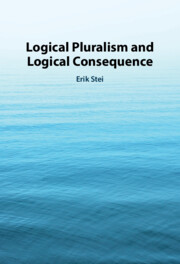Book contents
- Frontmatter
- Contents
- Figures
- Preface
- Chapter 1 Logical Pluralism Introduced
- Chapter 2 What Does It Mean for a Logic to Be Correct?
- Chapter 3 Three Dimensions of Plurality
- Chapter 4 The Cardinality of Logical Consequence
- Chapter 5 Domain Dependence
- Chapter 6 Pluralities of Meanings
- Chapter 7 Pluralism and Disagreement
- Chapter 8 Normativity and Collapse
- Chapter 9 Closing Remarks
- References
- Index
Chapter 1 - Logical Pluralism Introduced
Published online by Cambridge University Press: 23 March 2023
- Frontmatter
- Contents
- Figures
- Preface
- Chapter 1 Logical Pluralism Introduced
- Chapter 2 What Does It Mean for a Logic to Be Correct?
- Chapter 3 Three Dimensions of Plurality
- Chapter 4 The Cardinality of Logical Consequence
- Chapter 5 Domain Dependence
- Chapter 6 Pluralities of Meanings
- Chapter 7 Pluralism and Disagreement
- Chapter 8 Normativity and Collapse
- Chapter 9 Closing Remarks
- References
- Index
Summary
In its most general form, logical pluralism is the view that there is more than one correct logic. I call this generic claim "the plurality thesis". Different versions of logical pluralism emerge with different implementations of that thesis and, most notably, of its key components logic and correctness. On some readings of the plurality thesis, logical pluralism is completely uncontroversial, on others it may turn out to be a rather exciting position. In this opening chapter, I identify an interesting, revisionist reading of the plurality thesis that is inconsistent with both logical monism and logical nihilism. Logical pluralism, so understood, claims that there are at least two correct theories of logical consequence. The chapter sketches historical developments of the view and gives an outline of the arguments defended in the book.
Keywords
Information
- Type
- Chapter
- Information
- Logical Pluralism and Logical Consequence , pp. 1 - 11Publisher: Cambridge University PressPrint publication year: 2023
